Neoliberalism's Impact on Democracy in Latin America After 1990s
VerifiedAdded on 2022/10/10
|8
|1703
|266
Essay
AI Summary
This essay delves into the complex relationship between neoliberalism and democracy, particularly in the post-1990s era. It examines the core tenets of neoliberalism, rooted in laissez-faire economics, and its divergence from democratic ideals. The essay uses Latin America, specifically Venezuela under Hugo Chavez, as a case study to illustrate how neoliberal policies and the influence of the United States affected democratic processes. It explores how Chavez's socialist-leaning policies, influenced by neoliberalism, led to economic and political challenges, including inflation and economic decline. The role of the United States in the region is analyzed, highlighting the country's efforts to promote its version of democratic ideals. The essay concludes that neoliberalism, despite its emphasis on economic growth, often undermines democratic principles, particularly regarding social equality and state intervention. The essay highlights the erosion of democratic ideals, the impact of economic policies, and the influence of external actors in shaping political landscapes.
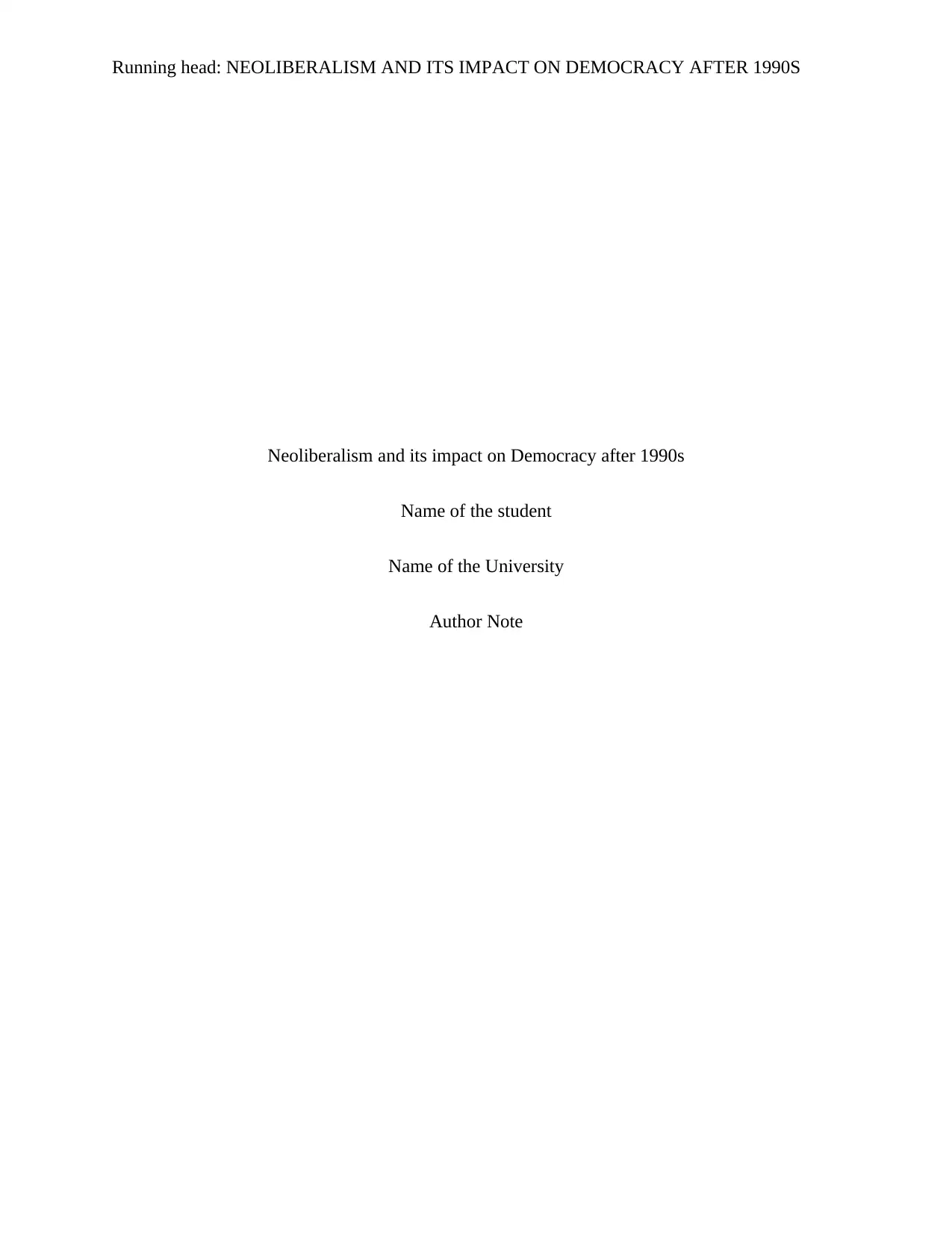
Running head: NEOLIBERALISM AND ITS IMPACT ON DEMOCRACY AFTER 1990S
Neoliberalism and its impact on Democracy after 1990s
Name of the student
Name of the University
Author Note
Neoliberalism and its impact on Democracy after 1990s
Name of the student
Name of the University
Author Note
Paraphrase This Document
Need a fresh take? Get an instant paraphrase of this document with our AI Paraphraser
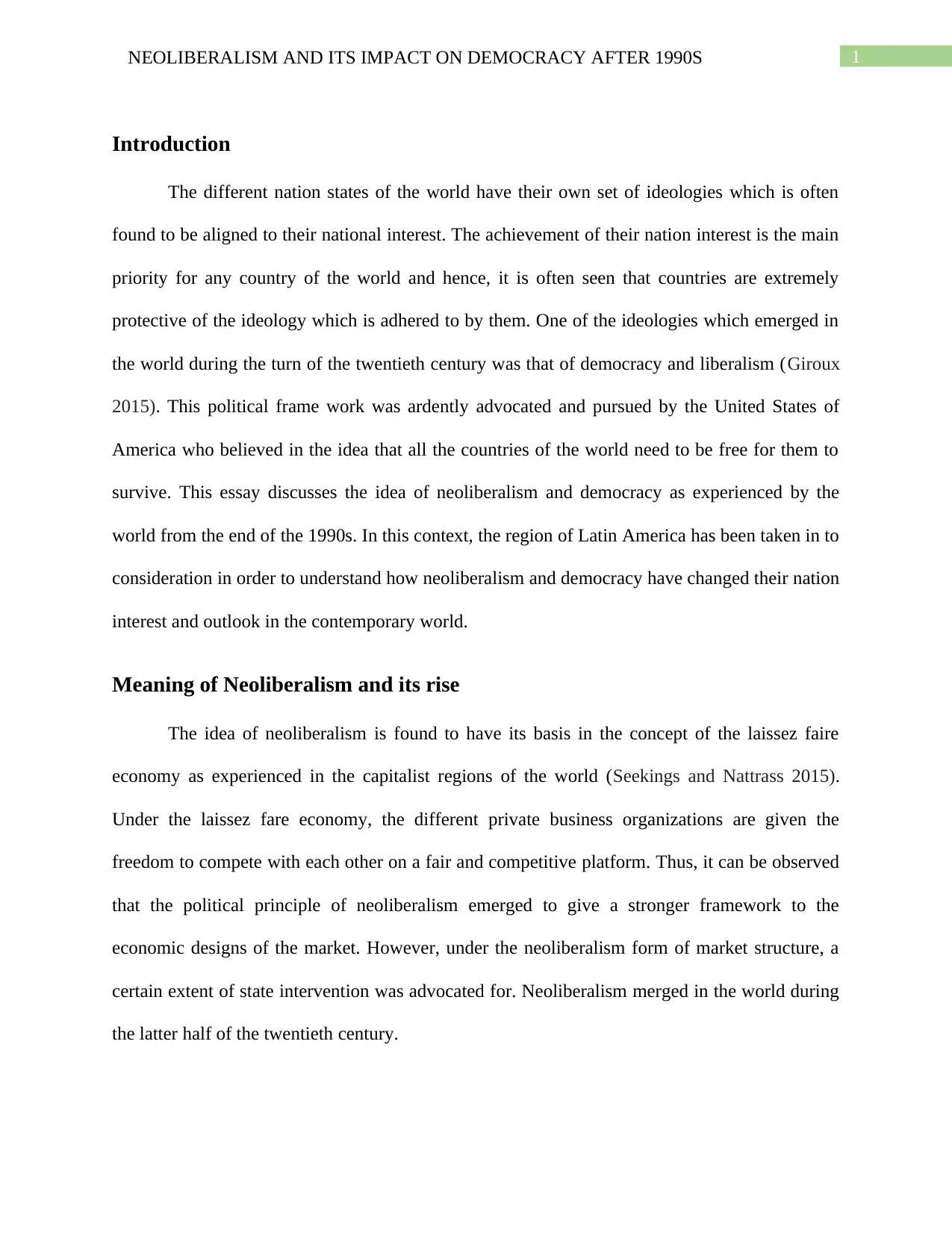
1NEOLIBERALISM AND ITS IMPACT ON DEMOCRACY AFTER 1990S
Introduction
The different nation states of the world have their own set of ideologies which is often
found to be aligned to their national interest. The achievement of their nation interest is the main
priority for any country of the world and hence, it is often seen that countries are extremely
protective of the ideology which is adhered to by them. One of the ideologies which emerged in
the world during the turn of the twentieth century was that of democracy and liberalism (Giroux
2015). This political frame work was ardently advocated and pursued by the United States of
America who believed in the idea that all the countries of the world need to be free for them to
survive. This essay discusses the idea of neoliberalism and democracy as experienced by the
world from the end of the 1990s. In this context, the region of Latin America has been taken in to
consideration in order to understand how neoliberalism and democracy have changed their nation
interest and outlook in the contemporary world.
Meaning of Neoliberalism and its rise
The idea of neoliberalism is found to have its basis in the concept of the laissez faire
economy as experienced in the capitalist regions of the world (Seekings and Nattrass 2015).
Under the laissez fare economy, the different private business organizations are given the
freedom to compete with each other on a fair and competitive platform. Thus, it can be observed
that the political principle of neoliberalism emerged to give a stronger framework to the
economic designs of the market. However, under the neoliberalism form of market structure, a
certain extent of state intervention was advocated for. Neoliberalism merged in the world during
the latter half of the twentieth century.
Introduction
The different nation states of the world have their own set of ideologies which is often
found to be aligned to their national interest. The achievement of their nation interest is the main
priority for any country of the world and hence, it is often seen that countries are extremely
protective of the ideology which is adhered to by them. One of the ideologies which emerged in
the world during the turn of the twentieth century was that of democracy and liberalism (Giroux
2015). This political frame work was ardently advocated and pursued by the United States of
America who believed in the idea that all the countries of the world need to be free for them to
survive. This essay discusses the idea of neoliberalism and democracy as experienced by the
world from the end of the 1990s. In this context, the region of Latin America has been taken in to
consideration in order to understand how neoliberalism and democracy have changed their nation
interest and outlook in the contemporary world.
Meaning of Neoliberalism and its rise
The idea of neoliberalism is found to have its basis in the concept of the laissez faire
economy as experienced in the capitalist regions of the world (Seekings and Nattrass 2015).
Under the laissez fare economy, the different private business organizations are given the
freedom to compete with each other on a fair and competitive platform. Thus, it can be observed
that the political principle of neoliberalism emerged to give a stronger framework to the
economic designs of the market. However, under the neoliberalism form of market structure, a
certain extent of state intervention was advocated for. Neoliberalism merged in the world during
the latter half of the twentieth century.
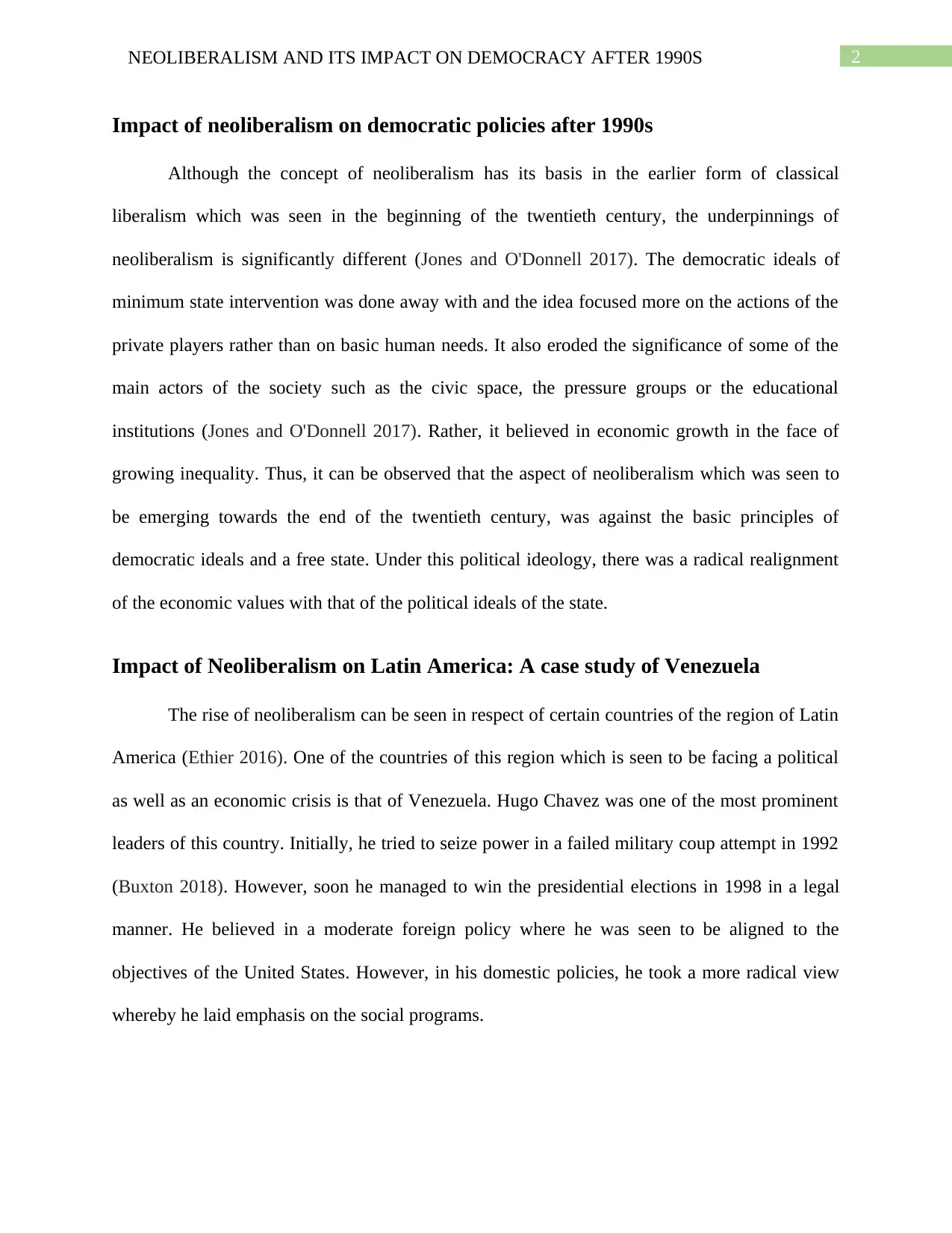
2NEOLIBERALISM AND ITS IMPACT ON DEMOCRACY AFTER 1990S
Impact of neoliberalism on democratic policies after 1990s
Although the concept of neoliberalism has its basis in the earlier form of classical
liberalism which was seen in the beginning of the twentieth century, the underpinnings of
neoliberalism is significantly different (Jones and O'Donnell 2017). The democratic ideals of
minimum state intervention was done away with and the idea focused more on the actions of the
private players rather than on basic human needs. It also eroded the significance of some of the
main actors of the society such as the civic space, the pressure groups or the educational
institutions (Jones and O'Donnell 2017). Rather, it believed in economic growth in the face of
growing inequality. Thus, it can be observed that the aspect of neoliberalism which was seen to
be emerging towards the end of the twentieth century, was against the basic principles of
democratic ideals and a free state. Under this political ideology, there was a radical realignment
of the economic values with that of the political ideals of the state.
Impact of Neoliberalism on Latin America: A case study of Venezuela
The rise of neoliberalism can be seen in respect of certain countries of the region of Latin
America (Ethier 2016). One of the countries of this region which is seen to be facing a political
as well as an economic crisis is that of Venezuela. Hugo Chavez was one of the most prominent
leaders of this country. Initially, he tried to seize power in a failed military coup attempt in 1992
(Buxton 2018). However, soon he managed to win the presidential elections in 1998 in a legal
manner. He believed in a moderate foreign policy where he was seen to be aligned to the
objectives of the United States. However, in his domestic policies, he took a more radical view
whereby he laid emphasis on the social programs.
Impact of neoliberalism on democratic policies after 1990s
Although the concept of neoliberalism has its basis in the earlier form of classical
liberalism which was seen in the beginning of the twentieth century, the underpinnings of
neoliberalism is significantly different (Jones and O'Donnell 2017). The democratic ideals of
minimum state intervention was done away with and the idea focused more on the actions of the
private players rather than on basic human needs. It also eroded the significance of some of the
main actors of the society such as the civic space, the pressure groups or the educational
institutions (Jones and O'Donnell 2017). Rather, it believed in economic growth in the face of
growing inequality. Thus, it can be observed that the aspect of neoliberalism which was seen to
be emerging towards the end of the twentieth century, was against the basic principles of
democratic ideals and a free state. Under this political ideology, there was a radical realignment
of the economic values with that of the political ideals of the state.
Impact of Neoliberalism on Latin America: A case study of Venezuela
The rise of neoliberalism can be seen in respect of certain countries of the region of Latin
America (Ethier 2016). One of the countries of this region which is seen to be facing a political
as well as an economic crisis is that of Venezuela. Hugo Chavez was one of the most prominent
leaders of this country. Initially, he tried to seize power in a failed military coup attempt in 1992
(Buxton 2018). However, soon he managed to win the presidential elections in 1998 in a legal
manner. He believed in a moderate foreign policy where he was seen to be aligned to the
objectives of the United States. However, in his domestic policies, he took a more radical view
whereby he laid emphasis on the social programs.
⊘ This is a preview!⊘
Do you want full access?
Subscribe today to unlock all pages.

Trusted by 1+ million students worldwide
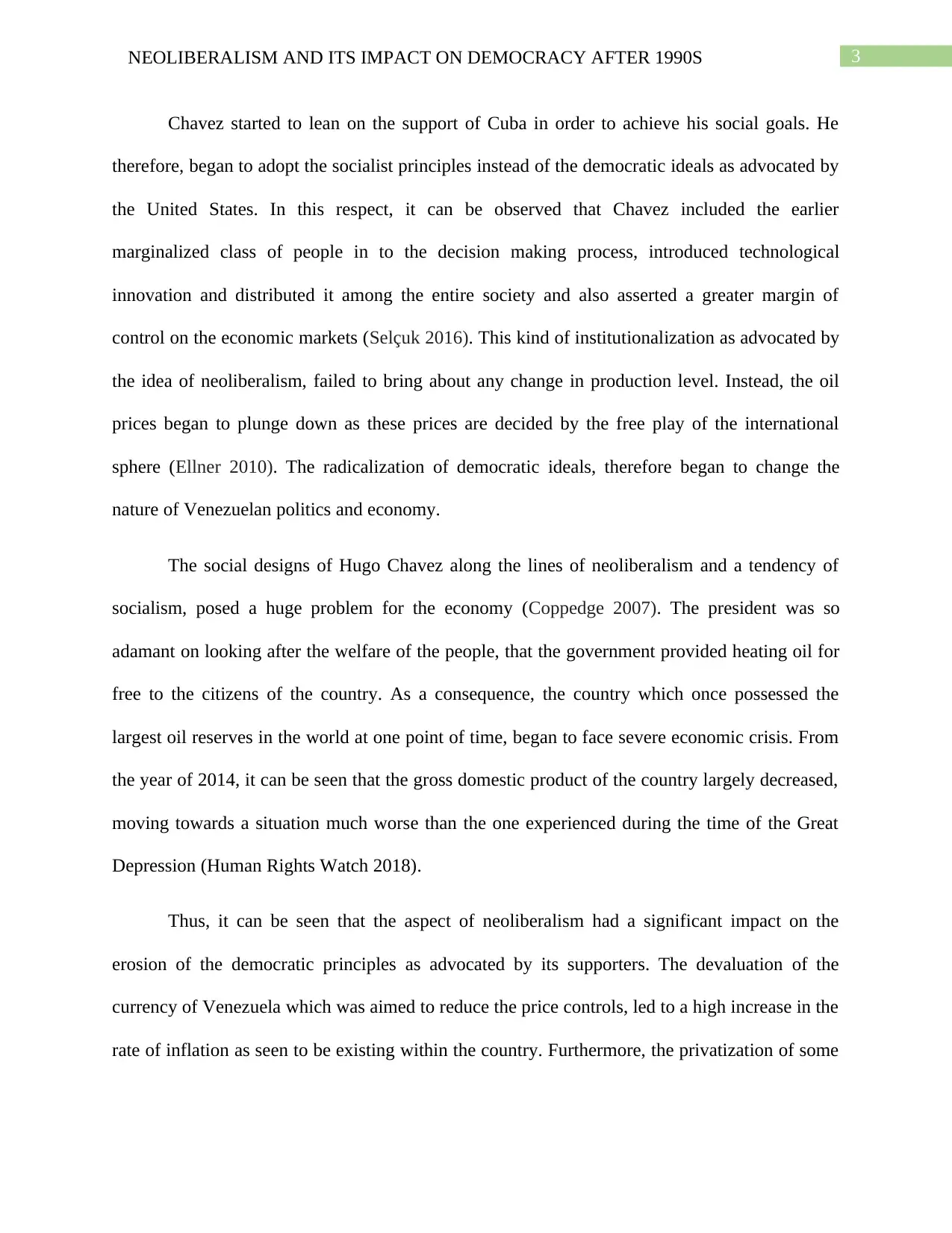
3NEOLIBERALISM AND ITS IMPACT ON DEMOCRACY AFTER 1990S
Chavez started to lean on the support of Cuba in order to achieve his social goals. He
therefore, began to adopt the socialist principles instead of the democratic ideals as advocated by
the United States. In this respect, it can be observed that Chavez included the earlier
marginalized class of people in to the decision making process, introduced technological
innovation and distributed it among the entire society and also asserted a greater margin of
control on the economic markets (Selçuk 2016). This kind of institutionalization as advocated by
the idea of neoliberalism, failed to bring about any change in production level. Instead, the oil
prices began to plunge down as these prices are decided by the free play of the international
sphere (Ellner 2010). The radicalization of democratic ideals, therefore began to change the
nature of Venezuelan politics and economy.
The social designs of Hugo Chavez along the lines of neoliberalism and a tendency of
socialism, posed a huge problem for the economy (Coppedge 2007). The president was so
adamant on looking after the welfare of the people, that the government provided heating oil for
free to the citizens of the country. As a consequence, the country which once possessed the
largest oil reserves in the world at one point of time, began to face severe economic crisis. From
the year of 2014, it can be seen that the gross domestic product of the country largely decreased,
moving towards a situation much worse than the one experienced during the time of the Great
Depression (Human Rights Watch 2018).
Thus, it can be seen that the aspect of neoliberalism had a significant impact on the
erosion of the democratic principles as advocated by its supporters. The devaluation of the
currency of Venezuela which was aimed to reduce the price controls, led to a high increase in the
rate of inflation as seen to be existing within the country. Furthermore, the privatization of some
Chavez started to lean on the support of Cuba in order to achieve his social goals. He
therefore, began to adopt the socialist principles instead of the democratic ideals as advocated by
the United States. In this respect, it can be observed that Chavez included the earlier
marginalized class of people in to the decision making process, introduced technological
innovation and distributed it among the entire society and also asserted a greater margin of
control on the economic markets (Selçuk 2016). This kind of institutionalization as advocated by
the idea of neoliberalism, failed to bring about any change in production level. Instead, the oil
prices began to plunge down as these prices are decided by the free play of the international
sphere (Ellner 2010). The radicalization of democratic ideals, therefore began to change the
nature of Venezuelan politics and economy.
The social designs of Hugo Chavez along the lines of neoliberalism and a tendency of
socialism, posed a huge problem for the economy (Coppedge 2007). The president was so
adamant on looking after the welfare of the people, that the government provided heating oil for
free to the citizens of the country. As a consequence, the country which once possessed the
largest oil reserves in the world at one point of time, began to face severe economic crisis. From
the year of 2014, it can be seen that the gross domestic product of the country largely decreased,
moving towards a situation much worse than the one experienced during the time of the Great
Depression (Human Rights Watch 2018).
Thus, it can be seen that the aspect of neoliberalism had a significant impact on the
erosion of the democratic principles as advocated by its supporters. The devaluation of the
currency of Venezuela which was aimed to reduce the price controls, led to a high increase in the
rate of inflation as seen to be existing within the country. Furthermore, the privatization of some
Paraphrase This Document
Need a fresh take? Get an instant paraphrase of this document with our AI Paraphraser
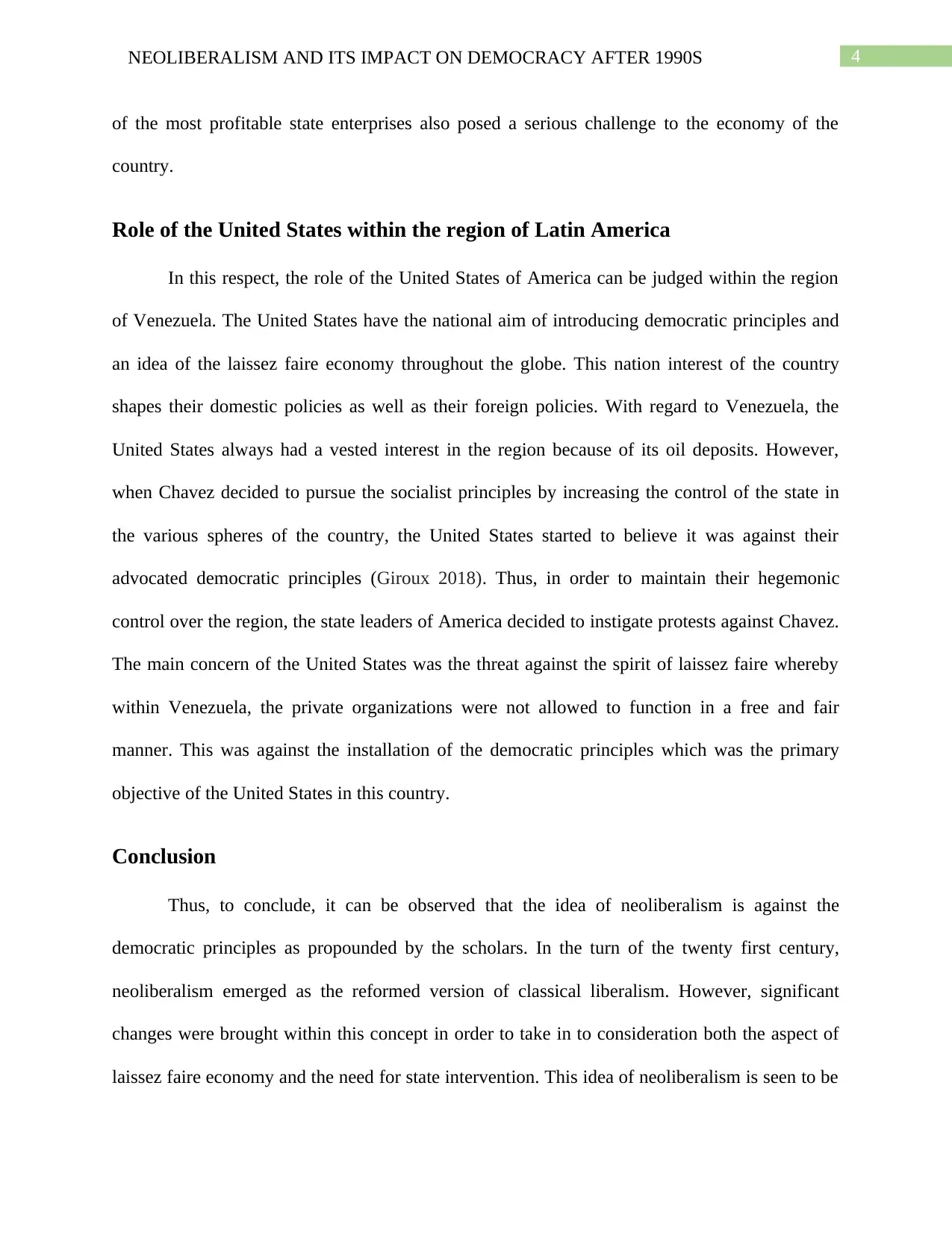
4NEOLIBERALISM AND ITS IMPACT ON DEMOCRACY AFTER 1990S
of the most profitable state enterprises also posed a serious challenge to the economy of the
country.
Role of the United States within the region of Latin America
In this respect, the role of the United States of America can be judged within the region
of Venezuela. The United States have the national aim of introducing democratic principles and
an idea of the laissez faire economy throughout the globe. This nation interest of the country
shapes their domestic policies as well as their foreign policies. With regard to Venezuela, the
United States always had a vested interest in the region because of its oil deposits. However,
when Chavez decided to pursue the socialist principles by increasing the control of the state in
the various spheres of the country, the United States started to believe it was against their
advocated democratic principles (Giroux 2018). Thus, in order to maintain their hegemonic
control over the region, the state leaders of America decided to instigate protests against Chavez.
The main concern of the United States was the threat against the spirit of laissez faire whereby
within Venezuela, the private organizations were not allowed to function in a free and fair
manner. This was against the installation of the democratic principles which was the primary
objective of the United States in this country.
Conclusion
Thus, to conclude, it can be observed that the idea of neoliberalism is against the
democratic principles as propounded by the scholars. In the turn of the twenty first century,
neoliberalism emerged as the reformed version of classical liberalism. However, significant
changes were brought within this concept in order to take in to consideration both the aspect of
laissez faire economy and the need for state intervention. This idea of neoliberalism is seen to be
of the most profitable state enterprises also posed a serious challenge to the economy of the
country.
Role of the United States within the region of Latin America
In this respect, the role of the United States of America can be judged within the region
of Venezuela. The United States have the national aim of introducing democratic principles and
an idea of the laissez faire economy throughout the globe. This nation interest of the country
shapes their domestic policies as well as their foreign policies. With regard to Venezuela, the
United States always had a vested interest in the region because of its oil deposits. However,
when Chavez decided to pursue the socialist principles by increasing the control of the state in
the various spheres of the country, the United States started to believe it was against their
advocated democratic principles (Giroux 2018). Thus, in order to maintain their hegemonic
control over the region, the state leaders of America decided to instigate protests against Chavez.
The main concern of the United States was the threat against the spirit of laissez faire whereby
within Venezuela, the private organizations were not allowed to function in a free and fair
manner. This was against the installation of the democratic principles which was the primary
objective of the United States in this country.
Conclusion
Thus, to conclude, it can be observed that the idea of neoliberalism is against the
democratic principles as propounded by the scholars. In the turn of the twenty first century,
neoliberalism emerged as the reformed version of classical liberalism. However, significant
changes were brought within this concept in order to take in to consideration both the aspect of
laissez faire economy and the need for state intervention. This idea of neoliberalism is seen to be
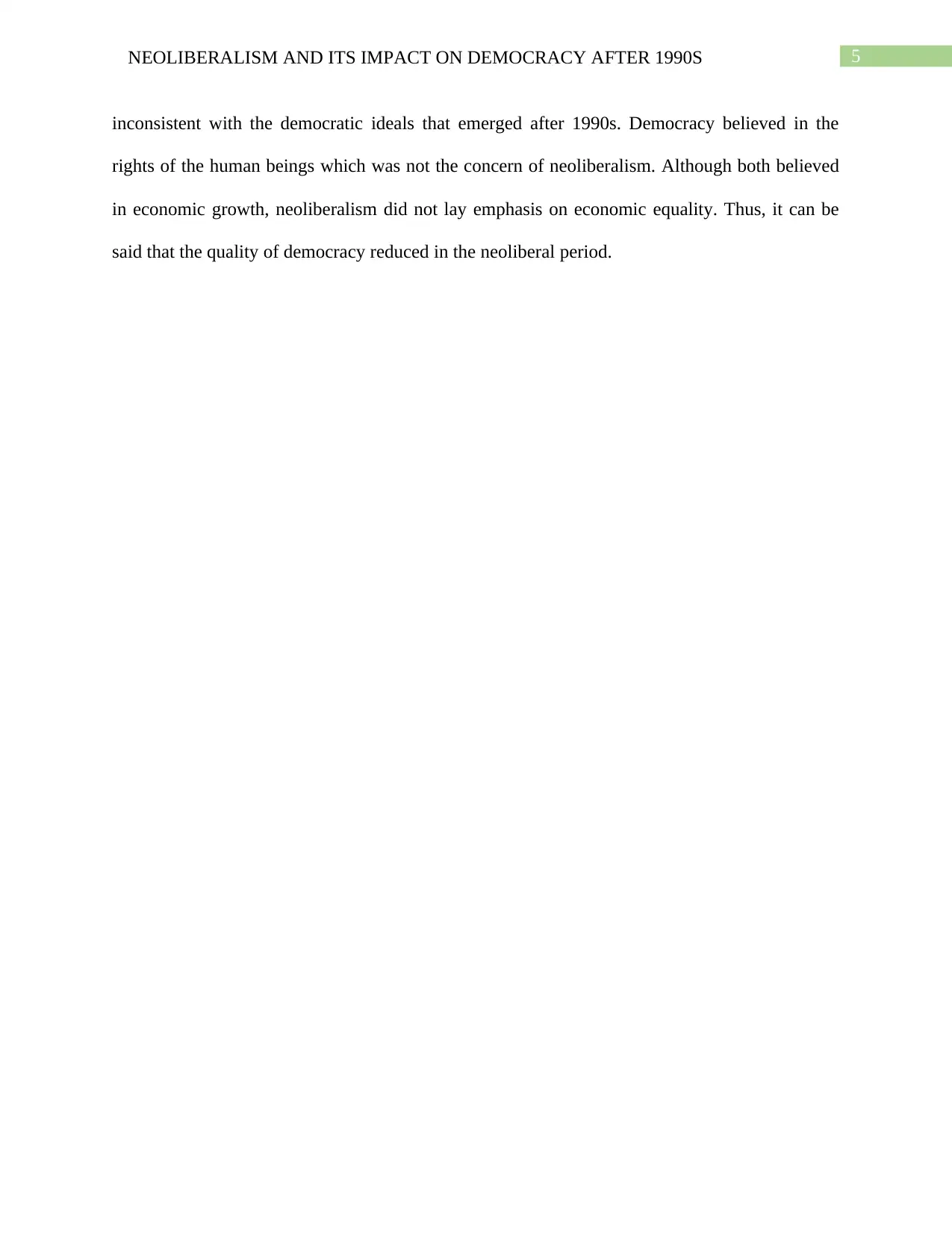
5NEOLIBERALISM AND ITS IMPACT ON DEMOCRACY AFTER 1990S
inconsistent with the democratic ideals that emerged after 1990s. Democracy believed in the
rights of the human beings which was not the concern of neoliberalism. Although both believed
in economic growth, neoliberalism did not lay emphasis on economic equality. Thus, it can be
said that the quality of democracy reduced in the neoliberal period.
inconsistent with the democratic ideals that emerged after 1990s. Democracy believed in the
rights of the human beings which was not the concern of neoliberalism. Although both believed
in economic growth, neoliberalism did not lay emphasis on economic equality. Thus, it can be
said that the quality of democracy reduced in the neoliberal period.
⊘ This is a preview!⊘
Do you want full access?
Subscribe today to unlock all pages.

Trusted by 1+ million students worldwide
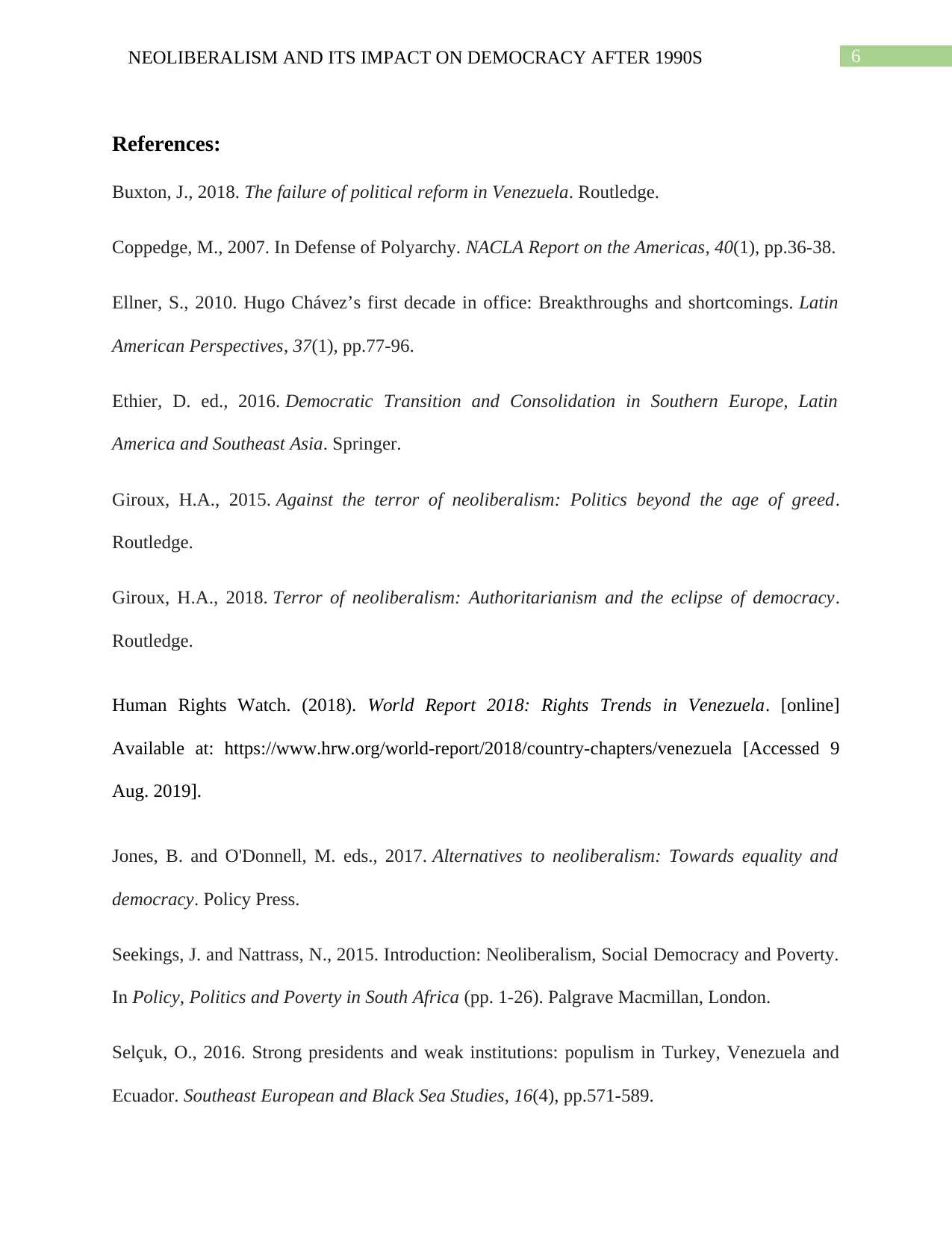
6NEOLIBERALISM AND ITS IMPACT ON DEMOCRACY AFTER 1990S
References:
Buxton, J., 2018. The failure of political reform in Venezuela. Routledge.
Coppedge, M., 2007. In Defense of Polyarchy. NACLA Report on the Americas, 40(1), pp.36-38.
Ellner, S., 2010. Hugo Chávez’s first decade in office: Breakthroughs and shortcomings. Latin
American Perspectives, 37(1), pp.77-96.
Ethier, D. ed., 2016. Democratic Transition and Consolidation in Southern Europe, Latin
America and Southeast Asia. Springer.
Giroux, H.A., 2015. Against the terror of neoliberalism: Politics beyond the age of greed.
Routledge.
Giroux, H.A., 2018. Terror of neoliberalism: Authoritarianism and the eclipse of democracy.
Routledge.
Human Rights Watch. (2018). World Report 2018: Rights Trends in Venezuela. [online]
Available at: https://www.hrw.org/world-report/2018/country-chapters/venezuela [Accessed 9
Aug. 2019].
Jones, B. and O'Donnell, M. eds., 2017. Alternatives to neoliberalism: Towards equality and
democracy. Policy Press.
Seekings, J. and Nattrass, N., 2015. Introduction: Neoliberalism, Social Democracy and Poverty.
In Policy, Politics and Poverty in South Africa (pp. 1-26). Palgrave Macmillan, London.
Selçuk, O., 2016. Strong presidents and weak institutions: populism in Turkey, Venezuela and
Ecuador. Southeast European and Black Sea Studies, 16(4), pp.571-589.
References:
Buxton, J., 2018. The failure of political reform in Venezuela. Routledge.
Coppedge, M., 2007. In Defense of Polyarchy. NACLA Report on the Americas, 40(1), pp.36-38.
Ellner, S., 2010. Hugo Chávez’s first decade in office: Breakthroughs and shortcomings. Latin
American Perspectives, 37(1), pp.77-96.
Ethier, D. ed., 2016. Democratic Transition and Consolidation in Southern Europe, Latin
America and Southeast Asia. Springer.
Giroux, H.A., 2015. Against the terror of neoliberalism: Politics beyond the age of greed.
Routledge.
Giroux, H.A., 2018. Terror of neoliberalism: Authoritarianism and the eclipse of democracy.
Routledge.
Human Rights Watch. (2018). World Report 2018: Rights Trends in Venezuela. [online]
Available at: https://www.hrw.org/world-report/2018/country-chapters/venezuela [Accessed 9
Aug. 2019].
Jones, B. and O'Donnell, M. eds., 2017. Alternatives to neoliberalism: Towards equality and
democracy. Policy Press.
Seekings, J. and Nattrass, N., 2015. Introduction: Neoliberalism, Social Democracy and Poverty.
In Policy, Politics and Poverty in South Africa (pp. 1-26). Palgrave Macmillan, London.
Selçuk, O., 2016. Strong presidents and weak institutions: populism in Turkey, Venezuela and
Ecuador. Southeast European and Black Sea Studies, 16(4), pp.571-589.
Paraphrase This Document
Need a fresh take? Get an instant paraphrase of this document with our AI Paraphraser
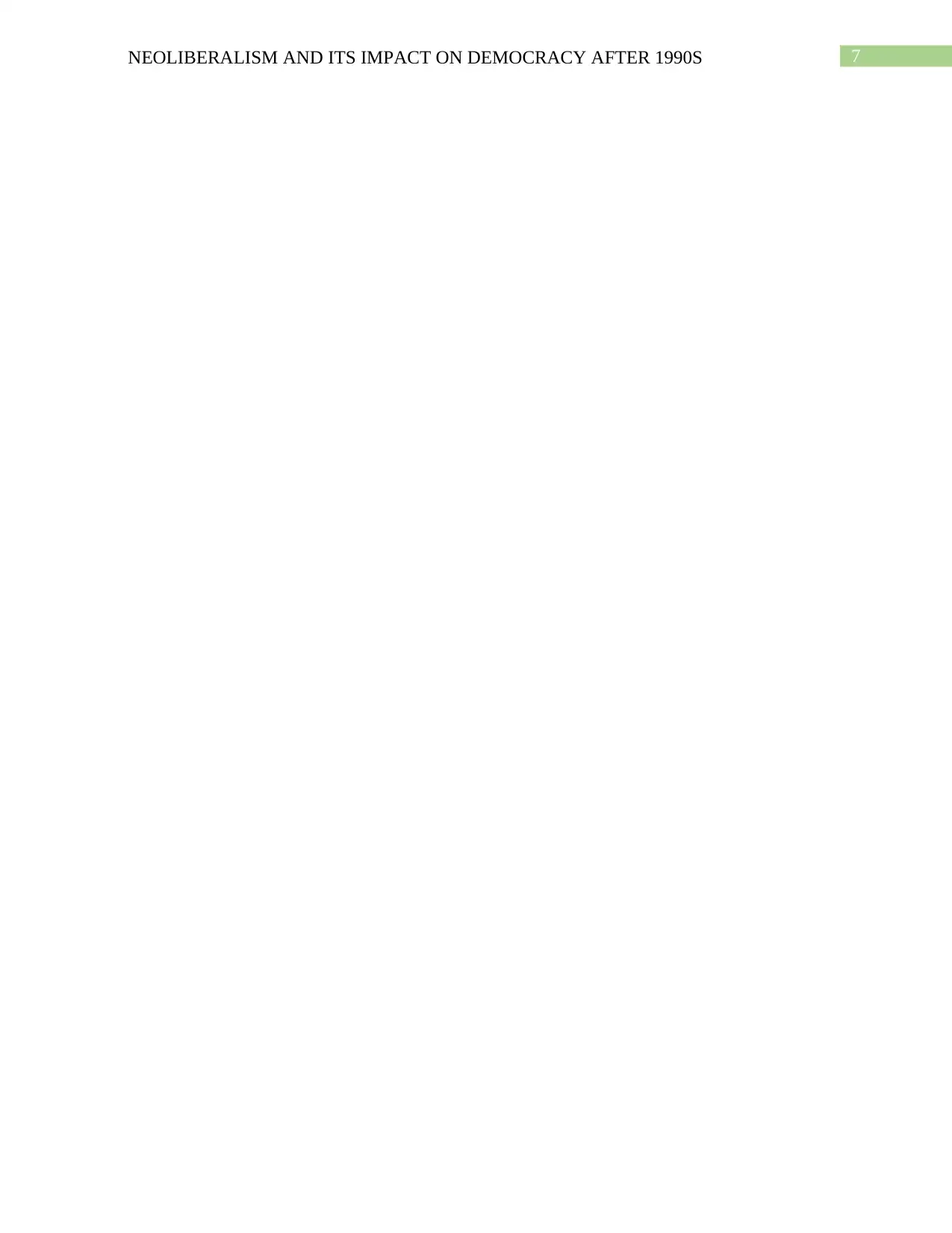
7NEOLIBERALISM AND ITS IMPACT ON DEMOCRACY AFTER 1990S
1 out of 8
Related Documents
Your All-in-One AI-Powered Toolkit for Academic Success.
+13062052269
info@desklib.com
Available 24*7 on WhatsApp / Email
![[object Object]](/_next/static/media/star-bottom.7253800d.svg)
Unlock your academic potential
Copyright © 2020–2025 A2Z Services. All Rights Reserved. Developed and managed by ZUCOL.




